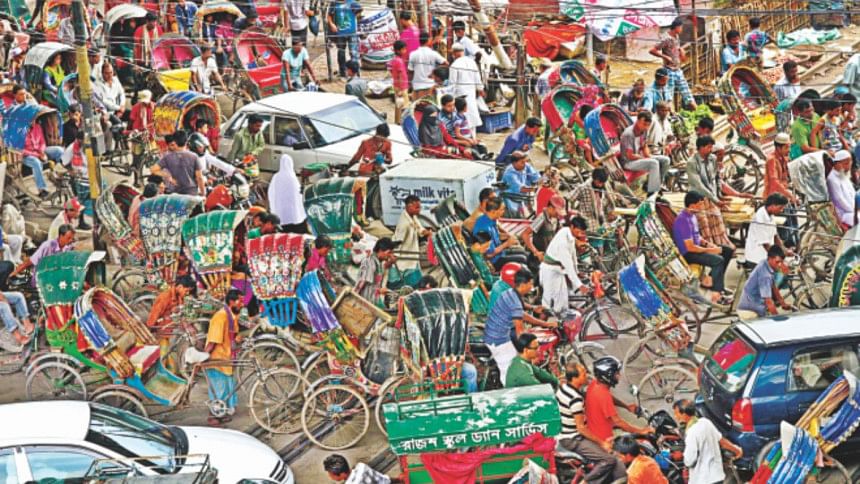Insanely Stuck: How do traffic jams affect our state of mind?

My five-year-old niece and I were practising drawing. She drew a sun and a moon and extended the rays of the sun a little further than necessary. I asked her what the rays were falling on and she drew a street. I asked her what was on the street, she made me draw a car (because she doesn't know how to yet). When I was finished with the car, she said, "More, Phuppi! There must be traffic jam!"
And it was thus that I came to the heartbreaking realisation that she will never know Dhaka streets that are traffic-free.
Unfortunately, there are consequences of traffic congestion direr than my niece's inability to imagine traffic-free roads. In fact, an aspect of traffic congestion that is often overlooked is its effect on our mental health. Research in this area focused on Dhaka seems to be scant. However, one study conducted at the University of California, reported on the Mail Online, based on data from the Midlife Development in the United States project and the National Study of Daily Experiences, from men and women aged 25–74, shows that mental health problems are not just affected by major life events, but also by seemingly minor emotional experiences. Professor Charles, in the above-mentioned study, cited two national surveys where psychologists found everyday irritations, such as waiting in traffic, can build up over time and cause mental problems later in life.
Closer to home, in Bangalore, a comparative parallel study titled "Effect of Traffic Congestion on Mental Health" was conducted by researchers S Venkatesh and G Pushpa. A 42-item questionnaire evaluating depression, anxiety and stress was administered to all subjects: 30 male city bus drivers as cases and 30 male bus conductors as controls in the age group of 20–60. The objective was to measure the emotional states of stress, anxiety and depression in city bus drivers and compare the results with non-drivers of similar working environment. The conclusion, not surprisingly, highlights that city bus drivers are more stressed compared to non-drivers working in the same environment. While Bangalore has an approximate population of 10 million, Dhaka's is 19 million. The emotional states of those who drive in Dhaka are best left to imagination.
Regardless of whether one drives or not, a report from the UK's Office of National Statistics, as quoted in Time magazine, finds that people who commute more than half an hour to work each way report higher levels of stress and anxiety than people with shorter commutes or no commutes at all. The same report found that people with commutes of any length experience lower life satisfaction and happiness than people with no commutes at all. Riding a bus for 30 minutes or longer was associated with the lowest levels of life satisfaction and happiness, but even if you're lucky enough to bike to work and enjoy the beautiful outdoors, your satisfaction takes a nosedive commensurate to how long you spend doing it. Researchers from the Saint Louis University School of Medicine and the Cooper Institute in Dallas have also noted that people with commutes of at least 10 miles each way have a higher tendency toward depression, anxiety, and social isolation.
And if psychosocial problems weren't enough, there are neuropsychological problems that may arise as a result of carbon monoxide and lead emissions that are part of traffic congestion. Quite a few studies have looked at the dangers of pollution on the human mind, particularly in urban areas where there are lots of cars. Scientists have demonstrated that the fumes and particles of pollutants that we inhale while waiting in traffic can contribute to memory loss and problems with reasoning.
Neurotoxicity is a term used to describe neurophysiological changes caused by exposure to toxic agents resulting in neurocognitive symptoms and/or psychiatric disturbances. Lead exposure is one of the most common exposures that can lead to significant neuropsychological and functional decline in humans. Although lead was removed from gasoline in 1999 in Bangladesh, according to a journal article on the Atmospheric Pollution Research, there remains a significant background concentration of lead with occasional samples reaching 8μg/m3. Carbon monoxide poisoning (COP), in addition to affecting morbidity and mortality, has been linked to Delayed Neurologic Sequels (DNS), symptoms and signs of which include memory problems, mental retardation, facial palsy, psychosis, chronic headache, seizures, and epilepsy. This was found in a report titled "Neurological Effects of Acute Carbon Monoxide Poisoning in Children" published in 2009.
Connections have also been found between Alzheimer's disease and a lack of physical activity over the course of one's life, and since, while in traffic, we are, for the most part, just sitting, the risk of developing Alzheimer's is also not as far-fetched as it seems. The more you move your body and use your mind, the less likely you are to develop Alzheimer's. So, spending a lot of time in traffic over the course of a lifetime is very likely to contribute to the disease as you age. In fact, a study published in the Lancet found that those who live closest to major traffic arteries were up to 12 percent more likely to be diagnosed with dementia—a small but significant increase in risk. The Guardian report on the study further elaborated that, while scientists have linked air pollution and traffic noise to reduced density of white matter (the brain's connective tissue) and lower cognition previously, more recently the study suggested that magnetic nano-particles from air pollution can make their way into brain tissue.
I am not a mental health expert or a traffic expert. And I haven't really come across any research or experts who are studying the link between traffic congestion and mental health in Dhaka. But I can say fairly confidently that if one does, the findings are unlikely to be elevating. Of course, we can make better use of our time spent in traffic by playing word games, making work calls (or personal calls), or even meditating (almost necessary to keep some semblance of sanity). But if we have reached the point where our children are unable to imagine traffic-free roads, I am beginning to wonder if we will indeed lose all sanity, staying stuck in traffic.
Shagufe Hossain is the founder of Leaping Boundaries and a member of the editorial team at The Daily Star.










Comments